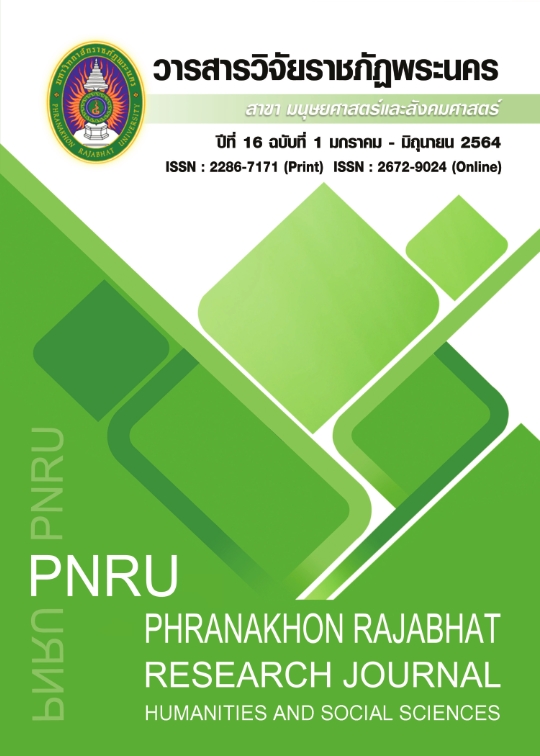YUNNAN PEOPLE IN BAN HUAI PHUENG VILLAGE DOI MAE SALONG, MAE FAH LUANG DISTRICT, CHIANG RAI PROVINCE
Main Article Content
Abstract
The study is quality research, aiming to study the dynamic history of Yunnan people in Chiang Rai. The methods include documentation, in-depth interviewing by picking villages, interview primary sources that have prominent roles in their villages such as leaders, co-founders, professors and citizens living in Ban Huai Phueng Village. Other research methods include data collection, questionnaires and descriptive research.
The research revealed that Chiang Rai Province and Yunnan Province in China are located in close proximity due to their mountainous terrains and rivers that have been shared by the ethnic groups since the ancient period. These groups built economic and cultural connections which are close to Yunnan province for a long time. The northern parts of Thailand also have cultural backgrounds similar to Yunnan’s. Chiang Rai is the place that Yunnan people along with The Kuomintang, often referred to in English as the Nationalist Party of China immigrated to. Even though these Yunnan people were affected by worldwide trends, they closely upheld their traditional ways of living which were integrated by Sino-Thais and the conventional Chinese. This was reflected in the multi-language usage like Thai, Chinese, Northern Thai, and local ones. They lived altogether like the establishment, Mei Si Luo, which means peace in Chinese
Article Details
Each publish articles were copyright by Phranakorn Rajabhat University
Any contents which appeared in each articles in the journal were authors personal opinion. It did not relate to Phranakorn Rajabhat University and other instructors in the university. Each authors would take responsibility on their articles. If there are any mistake, the authors will take responsibility themselves
References
Qingsha, D. (2009). Status Quo of the Akha Nationality and Its Speakers in Wawee Township, Thailand. Peking. China Social Sciences Press.
Huawen, Z. & Yuling, M. (1997). Kunming Dialect Dictionary.Yunnan: Yunnan Education Publishing House.
Zhengyan, L., Mingkai, G. & Shuiqian, M. (1984). Shi Youwei.A Dictionary of Chinese Loanwords.Shanghai: Shanghai Lexicographical Publishing House.
Rong, L. (1998). Guiyang Dialect Dictionary.Jiangsu: Jiangsu Education Publishing House.
Guangzhou Foreign Languages Institute. (1994). Thai-Chinese Dictionary.Peking: Commercial Press.
Xude, Y. (2002). The Hui Nationality Trade caravan and the Southwest Silk Road Network—— A case study of Yunnan Muslims in northern Thailand.Yunnan. Yunnan University
Ping, H. (2005). Yunnan people emigrated to Southeast Asia. Journal of Yunnan University. 2005(3) : 61-74.
Peilin, C. (2008). Comparison of Chinese and Thai Kinship Terms .Xiamen: Xiamen University.
Xinyu, W. (2010).Research on the Method of Formation and Word Formation of Thai New Words. Yunnan : Yunnan University of Nationalities.
Jingmin, S. (2000). A comparative study of Loan words in Hong Kong. Shanghai: East China Normal University.
Yanmei, P. (2010). Research on Foreign Words in Burmese. Yunnan : Yunnan University of Nationalities.
Lei, Z. (2010). A comparative study of Chinese and Thai word formation. Yunnan: Yunnan University of Nationalities.
Huilin, C. (2008). Borrowing of Chinese in Thai loanwords. Xiamen : Xiamen University.
Yipeng, L. (2008). Investigation and research on the status quo of the Use of Foreign Language Words. Life Week : Hebei University.
Jarenwong, K. (1990). Study of Chinese immigrants (93 Brigade) in Northern Border Thailand. Economic, Social and Political Changes. Community Research and Development Institute Payap University.
Prapattong, P. (2010). Dynamics of Being Yunnanese-Chinese in Northern Thailand: The Integrations Into Thai-State.Ph.D.Dissertation. Chiangrai: Mae Fah Luang University.
Saeluo, D. (Interviewed on 16 June 2020). The head of Ban Huai Phueng Village Doi Mae Salong, Mae Fah Luang District, Chiang Rai Province.
Pitsitpanporn, N. (2005).Ethnic Groups Encyclopedia in Thailand:Chinese Yunnan. Bangkok : Aekpimthai.
Suntornpasut, S. (2005). Ethnic relations: Fundamental concepts in anthropology in studying ethnic identity of nation. and organization of ethnic relations.Bangkok: Ancient city.
Yongming, Z. (Interviewed on 12 July 2020 ) Chinese Teacher in Zhonghua School, Ban Huai Phueng Village Doi Mae Salong, Mae Fah Luang District, Chiang Rai Province.


